No products in the cart.
MOOCs Lifeline for India’s Struggling Higher ED Learners
Within a higher education system plagued with outdated curriculums, faculty shortages and inadequate capacity, the Moocs revolution offers a magical opportunity to Indian students to access free-of-charge supplementary enrichment courses offered by the world’s most renowned universities: Swati Roy & Summiya Yasmeen
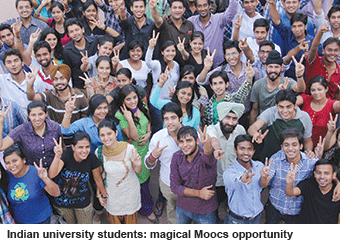 By all accounts it’s raining Moocs (massive open online courses) in India. Moocs are open online study programmes offered free-of-charge by content aggregators and reputable/aspirational higher education institutions to digitally connected students worldwide. This out-of-the-blue philanthropy of some of the world’s most expensive universities — Harvard, MIT, Dartmouth, etc — offering selected courses gratis, has generated huge excitement worldwide, especially in developing countries where most higher education syllabuses and curriculums are under-developed if not obsolete.
By all accounts it’s raining Moocs (massive open online courses) in India. Moocs are open online study programmes offered free-of-charge by content aggregators and reputable/aspirational higher education institutions to digitally connected students worldwide. This out-of-the-blue philanthropy of some of the world’s most expensive universities — Harvard, MIT, Dartmouth, etc — offering selected courses gratis, has generated huge excitement worldwide, especially in developing countries where most higher education syllabuses and curriculums are under-developed if not obsolete.
According to the California-based Coursera Inc, the world’s leading Moocs aggregator which offers study programmes of 140 top-ranked universities to 18 million registered users globally, India with 1.4 million learners is tied with China as its second largest customer nation. Similarly, edX — a Moocs platform founded by Harvard University and MIT — spokespersons estimate that India contributes 10 percent of its total learners i.e, 598,000, making it edX’s second largest customer nation after the US. Currently, this academic bounty is being showered on learners by over 40 Moocs providers offering online courses of 500 universities to 35 million students worldwide, including 2 million in India. Although registration and study is free, certification is chargeable.
With Moocs proving popular with students across the subcontinent, well-reputed indigenous higher ed institutions are also beginning to offer free online courses. On January 29, the premier Indian Institute of Management (IIM), Bangalore launched its online certificate series — Fundamentals of Business Management. On January 16, the newly established Bennett University, Noida signed up with edX to offer edX programmes to its first batch of students which begin classes in July. Earlier last year, the Indian Institute of Technology (IIT), Mumbai launched its own online platform to deliver courses while a consortium headed by IIT-Kanpur introduced a series of courses for the agriculture sector (AgMoocs). The National Programme on Technology Enhanced Learning — a joint initiative of the seven IITs (Bombay, Delhi, Madras, Kanpur, Kharagpur, Guwahati, Roorkee) and Indian Institute of Science, Bangalore — launched the NPTEL-Mooc last year. Nothing loath, the Union human resource development (HRD) ministry has also jumped onto the Moocs bandwagon by launching its own platform Swayam (Study Webs for Active-Learning for Young Aspiring Minds) under which 500 online courses are scheduled to be rolled out in April.
Within a higher education system plagued with outdated curriculums, faculty shortages and inadequate capacity, the Moocs revolution offers a magical opportunity to Indian students to sign up for supplementary higher education enrichment courses offered by several of the world’s most renowned universities.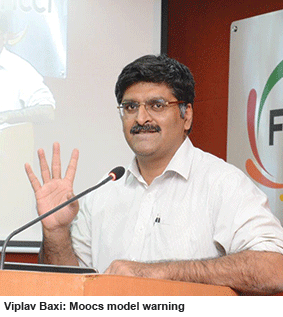
“The enthusiastic response of Indian learners to online learning, efforts to build digital content repositories, certifications and learning platforms, mark a strategic inflection point for Indian education. I believe that learning through Moocs will enable all Indians who want to learn, earn, teach or innovate, the capability to realise their true potential and transform our country.
However, we need to care deeply about which Moocs models we adopt. If our Moocs business models, content, pedagogies and technologies merely imitate archaic online teaching, training and certification programmes, we are destined to fail, this time on a far grander scale,” says Viplav Baxi, the Delhi-based chief product architect of Fliplearn.com, a free K-12 education platform, and also convenor of FICCI’s higher education sub-committee on Moocs.
In this context it is important to understand that the flood of ‘courses’ offered by Moocs aggregators and globally top-ranked universities are not the formal degree programmes offered to enrolled students but short-term, easy-to-learn (two-three hours per week) supplementary courses designed to augment the academic programmes of college/university students and/or working professionals. Thus teacher trainees and in-service teachers could sign up for several courses including ‘Supporting children with difficulties in reading and writing’, ‘Inquiry science learning’, ‘Critical issues in urban education’ among others offered by blue-chip institutions including London, Rice and Chicago (Irvine) universities on www.coursera.org to enrich their teaching.
Moreover, most Moocs providers also offer certification (at modest prices) for learners who require proof of accomplishment.
The keen response of Indian higher ed learners to Moocs is not surprising given that a majority of the courses are designed by globally renowned universities, offering a never-before opportunity to sub-continental students to access high-quality content and tutorials delivered by top-notch international faculty. For instance edX — founded by MIT and Harvard University, both ranked among the world’s Top 10 universities by the highly respected London-based rating agencies QS and THE — offers 650 online courses designed by faculty of 85 premier universities such as California, Cornell, Harvard, MIT, Rice and Dartmouth. Of the 5 million students worldwide enrolled on this platform, 95 percent are university students and continuing learners, with a median age of 26 years.
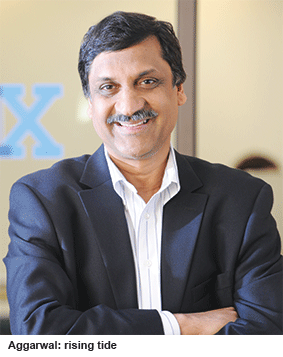 “Large numbers of students in India don’t have access to quality primary-secondary education, and at the same time higher education itself has not dramatically improved in quality or efficiency for a long while. EdX changes all of that by offering excellent learning programmes from top international universities to anyone, regardless of economics, gender, or geography. So for students in India who don’t have access to higher education, Moocs is a great alternative. And for students already in higher education, online courses can improve the quality of their education by combining the best of online and classroom learning.
“Large numbers of students in India don’t have access to quality primary-secondary education, and at the same time higher education itself has not dramatically improved in quality or efficiency for a long while. EdX changes all of that by offering excellent learning programmes from top international universities to anyone, regardless of economics, gender, or geography. So for students in India who don’t have access to higher education, Moocs is a great alternative. And for students already in higher education, online courses can improve the quality of their education by combining the best of online and classroom learning.
Online learning is a rising tide that lifts all boats — it provides access for those who don’t have it, and will enrich learning for those who do have access,” says Dr. Anant Aggarwal, chief executive officer of edX. An alumnus of IIT-Madras and Stanford University, Dr. Aggarwal is the celebrated professor of electrical engineering and computer science at MIT, who taught the first edX course on circuits and electronics from MIT, which drew 155,000 students from 162 countries. Currently IIT-Bombay, IIM-Bangalore and BITS-Pilani are part of the 85 member institutions offering Moocs on the edX platform.
Undoubtedly, the new Moocs phenomenon providentially offers India’s struggling higher education system — famously described as the “sick child of Indian education” by the late unlamented Union HRD minister Arjun Singh — a lifeline to sharply improve and upgrade learning outcomes. India’s government-dominated higher education system comprising a seemingly impressive 800 universities and 37,000 colleges presents a bleak picture of obsolete curriculums, crumbling infrastructure, funds constraints and faculty shortages — 30 percent of faculty positions are vacant countrywide. Unsurprisingly, only two of India’s 800 universities are ranked in the QS Top 200 World University Rankings 2015.
Although privileged, the mere 20 percent of youth in the age group 19-24 years who are enrolled in higher education institutions (cf. 88 percent in the US, 30 percent in China) don’t necessarily acquire meaningful education. According to a 2011 FICCI-Ernst & Young report, India hosts the world’s largest population of unemployable youth with over 80 percent of college/university graduates lacking identifiable marketable skills. A more recent (2014) study conducted by the Gurgaon-based recruitment firm Aspiring Minds, reveals that a mere 19 percent of the country’s engineering graduates are readily employable, and that over half (53 percent) of arts, science and commerce graduates are unfit for employment.
Consequently, the prospect of students in the metros, tier II and III cities, remote small towns and perhaps even villages, being able to access content and lectures of premier universities over the internet is an exciting development for the great majority of India’s 135 million educationally under-served youth, 27 million tertiary students who want to supplement their university education and become employable, as also working professionals aspiring to upgrade their knowledge, skills and workplace productivity.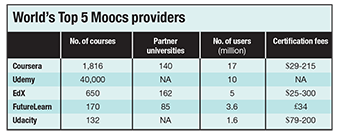
“For the millions of students in India who have dropped out of higher education, Moocs are a viable alternative to no further education, while those already enrolled in colleges can use them to develop employability skills. There is huge scope for career-related education in India, with the mismatch between industry requirements and university education widening. On Coursera, the highest enrolment from India is in business, technology and programming courses by learners in the 18-40 years age bracket. Our internal survey shows that learners have derived tangible benefits such as promotions, pay raises, and better job opportunities after completion of Moocs courses,” says Kabir Chadha, an alumnus of Stanford University, former consultant at McKinsey, New York and currently country manager (India) of Coursera.
Founded in 2012 by two computer science professors of Stanford University — Dr. Daphne Koller and Dr. Andre Ng — Coursera is the world’s largest Moocs aggregator providing 1,816 online courses of 140 partner universities in 29 countries. In August last year, the Mumbai-based Times Internet Ltd (TIL) — a subsidiary of Bennett Coleman & Co which publishes India’s leading national dailies including Times of India, Economic Times and over a dozen magazines, and owns television channels Times Now and ET Now — signed a “strategic partnership” agreement with Coursera. In addition to investing $49.5 million (Rs.335.7 crore) together with other investors, under the partnership agreement, TIL will provide Coursera marketing, advertising and strategic support in India. “Our decision to invest in Coursera was based on the potential impact of online learning in delivering high-quality education to millions in India. In the next few years, we expect to see astounding growth in the number of Indians taking online courses to enhance their education and career skills,” says Puneet Singhvi, business head of TIL.
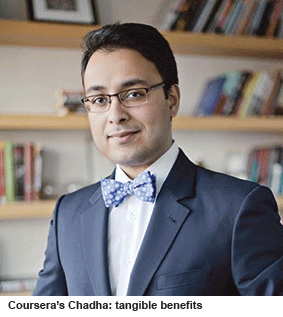 Other leading Moocs providers are also bullish about India. Recently, California-based Udacity, founded by Sebastian Thrun, formerly computer science professor at Stanford University, Prof. David Evans (University of Virginia) and Mike Sokolsky (Stanford University), announced scholarships for 500 students from India in partnership with Google and Tata Trusts to pursue its Android nanodegree programme (priced at Rs.9,800 per month). Currently 1.6 million users across the world, including 112,000 from India, are enrolled in Udacity’s nanodegree (six-ten months) courses including web developer, data analyst, android developer, mobile game developer, etc.
Other leading Moocs providers are also bullish about India. Recently, California-based Udacity, founded by Sebastian Thrun, formerly computer science professor at Stanford University, Prof. David Evans (University of Virginia) and Mike Sokolsky (Stanford University), announced scholarships for 500 students from India in partnership with Google and Tata Trusts to pursue its Android nanodegree programme (priced at Rs.9,800 per month). Currently 1.6 million users across the world, including 112,000 from India, are enrolled in Udacity’s nanodegree (six-ten months) courses including web developer, data analyst, android developer, mobile game developer, etc.
Charging fees for certification is a recent development in the Moocs world. The first Mooc created in 2008 by Stephen Downes and George Siemens of the University of Manitoba, Canada was entirely free, as were the Moocs launched and popularised subsequently by Stanford professors Thrun (Udacity), and Dr. Koller and Ng (Coursera). But with Udacity and Coursera being spun off as for-profit enterprises, and the mushrooming growth of profit-driven Moocs providers worldwide in the past three years, fees became necessary to build viable business models. Moreover partner universities, though willing to offer free courseware, demanded remuneration to meet testing and certification costs. In 2014, Udacity became the first prominent Moocs provider to stop issuing free course completion certificates, followed by Coursera and edX in 2015. Thus, while course materials are still available free-of-charge for independent study, to earn course completion certificates, students need to pay up. Fees for completion certificates vary from $25 (Rs.1,719)-$1,000 (Rs.68,394) with most Moocs providers including Coursera, offering special prices for the Indian market (see box).
Similarly, Indian higher ed institutions offering Moocs have introduced fees for awarding completion certificates. For instance, IIM-Bangalore, which currently offers eight Moocs courses, charges students $25 (Rs.1,710) to $79 (Rs.5,405) for awarding IIMBx course completion certificates. An estimated 100,000 students from 185 countries have enrolled in IIMBx-MOOCs with 4,000 having been conferred certification.
In the academic year 2016-17, IIM-Bangalore proposes to offer 15-20 online courses in marketing, human resource, strategy and finance. “The demand for quality higher education in India is so huge that it cannot be met by real-estate based education.
New digital technologies enable us to make our courses easily available to aspiring learners. By offering free, open, online courses, IIM-B wants to share its expertise in business and management education with students, working professionals, entrepreneurs, small-scale business owners, homemakers and lifelong learners. That’s why we have consciously kept the fee for completion certificates very affordable. When students pay for completing a course, it makes them value the certification,” says Ramya Srinivasan, programme manager at IIMBx.
Given that only a small fraction of learners persist with free online courses until the certification stage, it’s a wonder why higher education institutions are increasingly offering Moocs programmes. Ajit Chauhan, vice chairman (online education), Amity University, Noida, one of the first private universities to offer Moocs, believes that they offer higher ed institutions a unique brand building opportunity by becoming accessible to a wider and diverse student audience. “Moocs are the best platform for universities to earn reputation and word of mouth publicity. Therefore we have steadily increased our open online courses to 16 and we also offer a three year BA online degree programme to 7,055 registered students,” says Chauhan.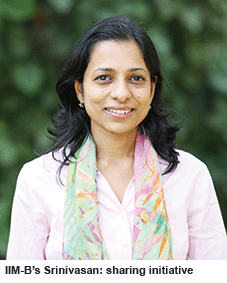
With highly ranked universities offering open access online courses, testing and certification, employers who were hitherto wary, are becoming receptive of Moocs certification. A 2014 study conducted by US-based Duke University and the not-for-profit RTI International found that 73 percent of employers “appreciated” job candidates who had completed career-related Moocs. Moreover recently the California-based LinkedIn.com (LinkedIn Corporation), the well-known professional networking website with 400 million members in 200 countries, introduced a feature under which its members can cite the certification of seven approved Mooc providers (Coursera, edX, Udemy, Udacity, etc) on their LinkedIn profiles.
Unsurprisingly, instead of undertaking expensive in-house training programmes, a growing number of corporates are directing employees to access approved Moocs progammes. Axis Bank, India’s’ third largest private sector bank with 2,805 branches in 1,796 cities and towns countrywide, signed an agreement with Coursera on February 17 under which its employees will have access to specified “world-class online certification programmes offered by top universities”.
Vijayakumar Menon, general manager (management services & projects) at Hindustan Organic Chemicals Ltd who boasts over 15 Moocs certificates on his résumé, agrees that online courses bring value addition and improve productivity and job performance of working professionals. “I have completed more than 15 Moocs on Coursera and edX over the past three years and received certification from top universities such as Berkeley, Columbia, and Washington. I have also recently completed two courses offered by IIM-B. With my job and personal commitments, high-quality Moocs are my best option for constantly improving business management skills and knowledge, and boosting my résumé,” says Menon.
Although Moocs are a post-2011 phenomenon, they are often confused with online degree programmes of universities and e-learning companies which have been around for more than two decades. However the major differentiator is that Moocs offer millions of students a wide spectrum of free online course options from content aggregators such as Coursera and recognised universities, whereas online degrees/study programmes are offered to formally admitted/enrolled applicants who pay tuition fees upfront. Moreover with students enrolling for online degrees of higher ed institutions and e-learning companies paying substantial tuition fees for tightly structured and monitored instruction, evaluation and certification, course completion rates are high. For instance the US-based online learning company simplilearn.com, which offers professional certification training programmes, has a completion rate of over 80 percent. On the other hand, completion rates for free-of-charge Moocs range between 10-45 percent, averaging 13 percent.
Joris Schut, a Netherlands-based education scientist, designer and information specialist, in his blogpost (March 4, 2015) lists three major reasons for the low completion rates of Moocs learners. “There are no incentives to keep you from dropping out; not everyone feels the need to complete the course and concepts such as ‘enrolment’ have different meanings from traditional education.”
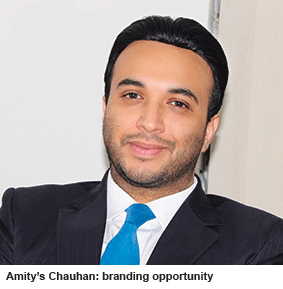 Adds Nooraine Fazal, an alumna of Boston University and former executive with IBM and Reuters with international work experience, and currently founder-CEO of the CISCE-affiliated K-12 Inventure Academy, Bangalore: “Completion rates for Moocs are low worldwide and even lower in India because online learning requires disciplined self-study to stay the course.
Adds Nooraine Fazal, an alumna of Boston University and former executive with IBM and Reuters with international work experience, and currently founder-CEO of the CISCE-affiliated K-12 Inventure Academy, Bangalore: “Completion rates for Moocs are low worldwide and even lower in India because online learning requires disciplined self-study to stay the course.
Indian students accustomed to structured school and college environments are not very adept at independent learning, and are also wary of education with no human and peer interaction. I personally enrolled in two Moocs programmes but didn’t go much further than a few classes because I missed the social and peer learning experience. But despite limitations, it’s only through technology innovations such as Moocs that we can reach quality education to the huge mass of under-served children and youth in India. Bricks-and-mortar education institutions cannot adequately address the challenges of Indian higher education.”
However according to Anant Aggarwal, CEO of edX, too much importance is being attached to course completion, i.e, certification. “While this data point, borrowed from the traditional university model, is certainly an important measure, it only represents one small segment of a very diverse group of Moocs learners. The goals of our learners are as diverse as they are. When they first enroll in a course, some may be interested in engaging with homework or interactive labs with some completing the coursework to earn a certificate. Others may simply want to browse and view a few videos. Although many are not interested in certificates, an impressive number are gaining so much more: access to world-class education and an engaged global community,” says Aggarwal.
Low completion rates apart, Moocs are also being criticised for slapdash assessment. Currently most Moocs providers use automated grading tools for testing, such as multiple choice, true/false, and short problem sets, and peer review assessments.
“Due to the sheer size of enrolments in Moocs programmes, manual grading by qualified faculty is not possible. Technological advances such as peer assessment, online group projects, adaptive learning, etc need to be explored, experimented and perfected over the coming years,” says Ramya Srinivasan of IIMBx programme.
According to Prof. Sukanta Bhattacharya, associate professor of economics at the University of Calcutta, doubtful assessment processes, poor internet broadband connectivity and student unpreparedness are major impediments to Moocs gaining traction in India. “The biggest roadblock to the success of online learning in India is that the vast majority has no access to computers and internet. Next is the process of certification. To be successfully evaluated through home assignments requires academic honesty on the part of learners, and society and industry to acknowledge the value of knowledge over paper degrees. I’m afraid we still lack both. I also believe that face-to-face interaction with teachers is still important for Indian students. Online courses can supplement traditional study programmes but can’t replace them,” says Bhattacharya.
Bhattacharya’s reservations about Moocs are not unfounded. According to UNDP’s Human Development Report 2015, a mere 18 percent of the Indian population are “internet users”. And of this 18 percent, a mere 5 percent have access to broadband connectivity — a prerequisite for accessing Moocs. A recent report by Akamai (State of the Internet, Q1-2015) also reveals that the average internet connection speed in India is just 2.3 Mbps (megabits per second), lower than the average 4 Mbps available in BRICS nations. Moreover as on March 2015, 18,452 villages in rural India are still bereft of electricity.
Leading Moocs providers, while acknowledging the challenge of digital connectivity, stress that only through disruptive technology innovations such as Moocs can quality education reach the huge mass of under-served children and youth in India.
“Admittedly online education delivery requires desktops, laptops, mobile phones and hi-speed internet connectivity, which the majority in India don’t have currently. But I’m confident over time more and more people will acquire connectivity. Moreover I have no doubt that people in India have the will to learn. Moocs have the potential to radically change higher education by providing access to quality education in a country where demand by far exceeds supply,” says Anant Agarwal of edX.
Quite clearly to realise the promise and potential of Moocs and free online primary-secondary education offered by the US-based Khan Academy which has debuted in India (see EducationWorld cover story February), the Central and state governments must invest in providing digital connectivity to the country’s tier II, III cities, and educationally backward small towns and villages. Under the Digital India project launched in June last year, the BJP government has promised to provide broadband connectivity to 200,000 villages, install 400,000 public internet access points, wi-fi access in 250,000 government schools and all universities, and wi-fi hotspots for citizens countrywide. This initiative, combined with the offshore bonanza of Moocs providers is a miraculous lifeline to hundreds of millions of children and youth struggling to keep up in India’s neglected schools and higher education institutions. To miss this providential opportunity would be a monumental tragedy.
With Paromita Sengupta (Bangalore) & Baishali Mukherjee (Kolkata)















Add comment